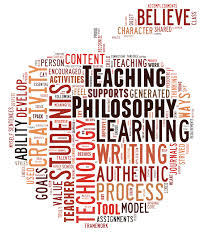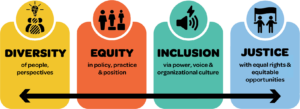 As I have dedicated my academic career to the improvement of classroom practices and learning, I take extreme pride in my teaching abilities. Having taught part-time at several institutions while in graduate school, I thought that I had codified in my mind a philosophy of teaching. However, in my first year of teaching as an assistant professor, I swiftly realized that this philosophy was premature, naïve, and containing an ample dose of hubris. Yet, when reflecting on this experience, I concluded that not only do I love and have a passion for teaching, I realized that teaching is becoming a part of who I am. Although humbling, this realization has only bolstered my desire to become an effective and inspiring college professor through the processes of assessment, evaluation, and adaptation.
As I have dedicated my academic career to the improvement of classroom practices and learning, I take extreme pride in my teaching abilities. Having taught part-time at several institutions while in graduate school, I thought that I had codified in my mind a philosophy of teaching. However, in my first year of teaching as an assistant professor, I swiftly realized that this philosophy was premature, naïve, and containing an ample dose of hubris. Yet, when reflecting on this experience, I concluded that not only do I love and have a passion for teaching, I realized that teaching is becoming a part of who I am. Although humbling, this realization has only bolstered my desire to become an effective and inspiring college professor through the processes of assessment, evaluation, and adaptation.
My first-year experiences at MSU Denver acted as a catalyst that lead me to considerable reflection and trial and error. As a consequence, I developed a distinct, yet ever-evolving teaching philosophy that lends itself to several fundamental teaching tenets from which I base my instruction.
A Commitment to Justice Diversity, Equity, and Inclusion (JEDI)
I strive to create a culture of inclusion, where all people feel welcome, empowered, and free from obstacles that may limit their academic experience. I stand against systemic racism and institutional inequities that harm Black and Indigenous persons and other people of color (BIPOC). I respect and value the many dimensions of human diversity, including culture, race, ethnicity, gender identity, sexual orientation, disability, neurodiversity, religion, socioeconomic status, age, body type, nationality, and language. I am committed to promoting justice, advocacy, and the sharing of diverse perspectives. This is part of our department and university’s mission to prepare students to be culturally responsive as they engage in the science and practice of psychology.
stand against systemic racism and institutional inequities that harm Black and Indigenous persons and other people of color (BIPOC). I respect and value the many dimensions of human diversity, including culture, race, ethnicity, gender identity, sexual orientation, disability, neurodiversity, religion, socioeconomic status, age, body type, nationality, and language. I am committed to promoting justice, advocacy, and the sharing of diverse perspectives. This is part of our department and university’s mission to prepare students to be culturally responsive as they engage in the science and practice of psychology.
Learner-Centered—Not Student Marginal Instruction
I have learned that one of the singular most effective methods to impart knowledge is through student-centered active learning. Frankly, students bring a wealth of personal experiences, knowledge, and personal theories to the classroom and if I can relate new information to their experiences through an active learning method, their learning is greatly enhanced (e.g., Poirier & Feldman, 2007; Richmond & Hagan, 2011; Warren, 2006). Whether students are non-traditional students or traditional students, I have found that if you can connect on a personal level, support your teaching with research and honesty, and engage them in active learning, students will greatly respect you as a teacher, retain and understand concepts at a higher level, and they will deeply consider what you have to say.
Inclusive Research Mentorship
I strongly believe that involving and mentoring undergraduate teaching and research assistants is incumbent upon exemplar high-quality professors. One of the reasons I became a college professor was because of this very experience and mentoring teaching and research assistants provide the opportunity to mold, shape, and discover my future replacement. I truly believe that we—as professors of psychology—should embrace this process. The lessons that are learned from this amazing experiential learning situation create memories and passion in and for the field of psychology, which will not only sustain our field but also compel it to flourish.
Socrates vs. The Simpsons
As the great Jane S. Halonen (2005) suggested, I too believe that it is important to engage rather than entertain. Far too often, our students expect us to entertain them rather than engage them to critically evaluate the information we present. This is a fine line that needs to be demarcated. This sentiment goes both ways. Additionally, far too often professors confuse entertainment with engagement. In every class, I try to engage my students by presenting puzzling results or discussing controversial issues. This allows my students to become motivated, engaged, and actively construct their knowledge about psychology and if I am lucky, about the process of thinking holistically. This does not mean that you can only use Socrates in your classroom, you may also use The Simpsons but not for entertainment, rather engage students to process information at a deeper level. Thus I pose two engaging quotes that to me embody the same important sentiment. “Education is the kindling of a flame, not the filling of a vessel.” Socrates (n.d.). “This year, I’d like to nominate my teacher- Ms. Krabappel [for teacher of year]. Shy may not be glamorous or entertaining. She’s just a normal teacher who’s always there. And, she’s never given up on me.” Bart Simpson (Vitti, 1989).
Depth vs. Breadth
Again, as the esteemed Jane S. Halonen (2005) suggested, I too believe that as instructors we need to go deep rather than broad. As someone rooted in cognitive and developmental theory, I understand the asymptotic level of students’ knowledge retention and the effect of deep processing versus surface-level processing (see Craik & Lockhart, 1972). I truly attempt to limit the information I expect my students to learn, so that they may master the information rather than have a cursory set of facts from which they will retain very little. I am amazed by the persistent push of instructors to cover all of the material, at what I believe, the cost of student learning. Indeed, Halonen (2005) commenting on Ericksen (1983) said it best:
Stanford Ericksen (1983) likened the process of exposing students to the light of the discipline by trying to cover the field to a good sunburn. It is uncomfortable in the acquisition and decidedly temporary in its impact. Unless the content of a course has personal relevance or the course provides opportunities that facilitate meaningful connections, the minutiae of what we teach will fade away like a suntan. (p. 130)
I Don’t Need No Stinkin’ Higher-Level Thinking!
Shell and Kleen (1992) and Dalai (1994) both argue that higher-level learning promotes critical thinking skills, which allow students to be creative, analytical, and evaluative, and thus should be infused into higher education curricula. As such, not only do I teach content, but also I specifically target skills (e.g., teaching metacognition and memory and learning strategies) that promote higher-level learning (e.g., Carney & Levin, 2003, Richmond, Carney, & Levin, 2011). Using these methods and teaching these skills not only helps my students understand the class material at a higher level, but it also allows a skill set that they may use in other classes. Essentially, this tenet embodies my belief that we should teach in a holistic principled manner, not just for the sake of our class.
Adapt or Die!
The adage “adapt or die” truly exemplifies my belief in classroom instruction. Even though I have been touting a few instructional methods, I will often change my instructional methods to reach students. This might be through the use of technology, or the Socratic Method, or direct teaching, or even one-on-one personal tutoring. Personally, being mired in one method of teaching hinders the learning process and students ultimately pay the price. Being able and willing to adapt makes me a far more resourceful and effective teacher.
The Ultimate Compliment: Disequilibrium
When I successfully employ these tenets I truly believe that my students learn at a higher-level and more importantly are compelled and challenged to learn. For example, when one of my students was asked what was it like to be in my class she said “Being in Dr. Richmond’s class is like being in a constant state of disequilibrium” (the inability to incorporate events into existing schema, Inhelder & Piaget, 1958). Initially, I thought she always felt confused. On the contrary, she explained to me that students in my class feel that they are constantly challenged, motivated, and seek to obtain a higher-level of learning because of my teaching. This was a true compliment that I carry with me to constantly remind myself to improve, challenge my students, and be the most effective teacher and mentor that I can become.
Life-long Learning + Pay it Forward = Scholarly Teaching
First, effective teachers continuously seek out new ideas, instructional methods, and ways of assessing students. To this end, I may go to conferences and attend teaching-related programming to gain insight and learn about the cutting edge Scholarship of Teaching and Learning (SoTL) to bring back to my classroom and experiment with or participating in workshops to learn how to improve my syllabus. Additionally, I would be remiss if I did not share my experience, knowledge, successes, and failures with other teachers. In so doing, I have given dozens of workshops and seminars at MSU Denver and regional and national conferences. By actively engaging in life-long learning on the improvement of teaching and continuously engaging in SoTL, I can become not only a SoTL scholar, but more importantly, a scholarly teacher who is informed, uses best practices, is engaging, and is highly effective.
 As stated in the American Psychological Association (APA) ethics code, I as the instructor and you as the student will not engage in any unfair discrimination based on age, gender, gender identity, race, ethnicity, culture, national origin, religion, sexual orientation, socioeconomic status, or any basis proscribed by law. In the content of this course, I will often address issues of gender, sexual orientation, and culture. To promote a safe learning environment, I will expect you to strictly adhere to the above APA code.
As stated in the American Psychological Association (APA) ethics code, I as the instructor and you as the student will not engage in any unfair discrimination based on age, gender, gender identity, race, ethnicity, culture, national origin, religion, sexual orientation, socioeconomic status, or any basis proscribed by law. In the content of this course, I will often address issues of gender, sexual orientation, and culture. To promote a safe learning environment, I will expect you to strictly adhere to the above APA code.